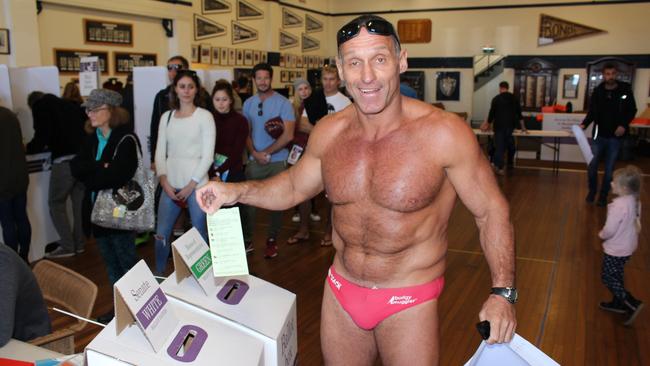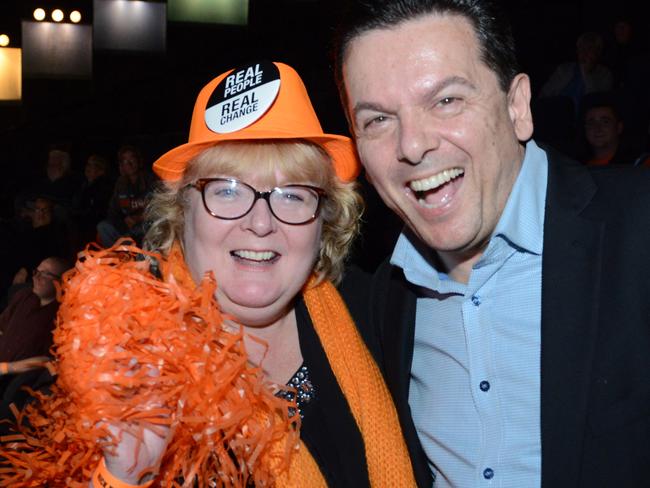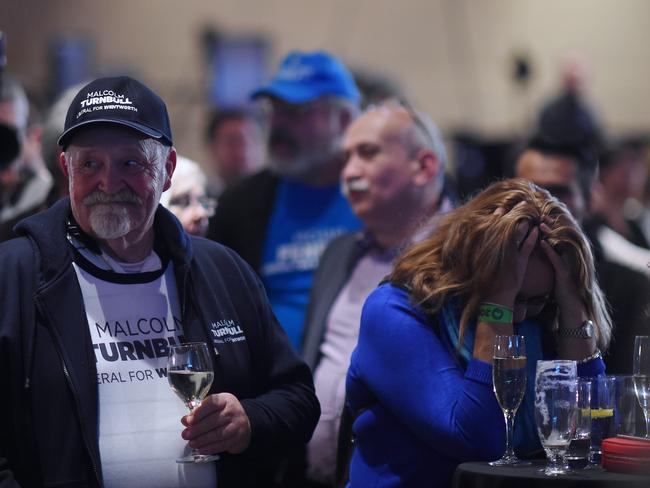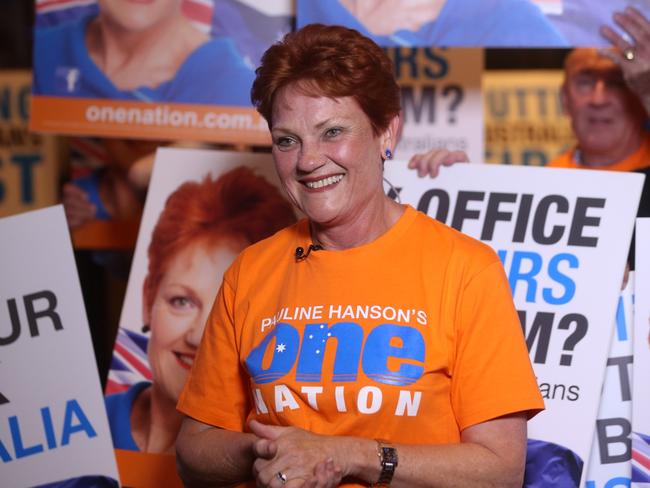Federal Election 2016: Vote counting has stopped, so what happens now?
IT’S Sunday morning and we don’t know who’s won, and counting won’t start again for days. Here’s what comes next.

IT IS the morning after an extraordinary election and the dust still hasn’t settled.
Vote counting has been stopped and won’t resume until Tuesday — yes, Tuesday — leaving the fate of the nation effectively on hold while everyone takes a breather.
With a 3.3 per cent swing against the Coalition, the country is facing the very real possibility of another hung parliament. Here’s what we know so far.
WHO IS WINNING?
With less than 80 per cent of the vote counted, the Coalition and Labor both have 67 seats. To form government, you need 76 seats.
Eleven seats are in doubt. The Coalition is ahead in five of those seats, while Labor leads in six. The other five seats have been won by two independents, one Greens MP, Bob Katter, and one from Nick Xenophon’s party.
The seats in doubt are Capricornia, Chisolm, Cowan, Dickson, Dunkley, Forde, Gilmore, Herbert, Hindmarsh, La Trobe and Petrie. The Coalition is ahead in Dickson, Dunkley, Gilmore, La Trobe and Petrie.

WHY HAS THE VOTE COUNTING STOPPED?
Counting stopped at 2am on Sunday morning and will not resume until Tuesday. On the night of the election, the Australian Electoral Commission only counts “ordinary votes” from polling places.
That means first preference and two-candidate-preferred votes for House of Representatives ballot papers, and first preferences for the Senate ballot papers.
The AEC says it has counted more than 11 million House of Representatives votes.
Counting of absentee and postal votes is carried out in the week after election day. This year, about 2.5 million people cast their votes early.
After counting stopped on Sunday, all ballots will now be sent to secure locations in each electorate for counting.
This was one of the recommendations of a review into the bungled WA Senate vote in 2013, which saw 1370 ballots go missing, forcing a fresh election and leading to the resignation of the head of the AEC.
“The AEC’s focus today [Sunday] is on the declaration vote exchange,” the AEC said in a statement.
“The declaration vote exchange is where the large numbers of absent, interstate, postal and other declaration votes are reconciled, sorted and packaged ready for dispatch to the home division from Monday.
“Only once the declaration votes are received and processed in the home division can the counting of these votes begin. Any counting today will be limited to the small numbers of votes collected by AEC mobile teams.
“On Monday, the AEC will continue the process of verifying more than one million postal votes already returned to the AEC so that they can be admitted to the count beginning on Tuesday.”
The AEC says while that is going on, the count of pre-poll Senate votes and “any remaining House of Representatives ordinary pre-poll votes not already counted on Saturday” may resume on Monday.
WHERE DO WE GO FROM HERE?

There are two main scenarios that could play out in the coming days.
The first is that the Coalition wins the nine seats required to form a majority government. The second is that Labor picks up a number of “in doubt” seats and Australia has another hung parliament.
The ABC’s Antony Green says a Labor majority government is not a possibility despite them being ahead in six of 11 seats still undecided.
Green said the process could be “long and tedious” and could be dragged out further by legal challenges.
A hung parliament last happened in 2010 when crossbenchers Rob Oakeshott, Tony Windsor and Adam Bandt helped a Julia Gillard-led Labor Party form government. Before that, the last hung parliament was in 1940.
WHAT WOULD A HUNG PARLIAMENT MEAN?
In 2010, Labor reached a formal agreement with the crossbenchers to form government.
Should the Coalition get 74 or 75 seats it doesn’t necessarily have to enter a formal agreement. “I’m sure there won’t be a deal in the formal sense that we saw in 2010,” said Clement Macintyre, politics professor at the University of Adelaide, who says the Coalition will have seen what happened to Labor the last time around.
“The negotiations obviously carried costs. Agreements were made and there was a price for the support of the independents. I think a government should talk to the independents, but pursue its own legislative agenda and stare down any demands.
“A smart government would not enter into a formal agreement, but simply say, we’re the largest party. The Coalition will be seeking allies for its legislative agenda.”
Professor Macintyre said if that were the case, parliament would simply resume.
“What would happen is, 150 MPs will gather in Canberra, and the first item will be to elect a speaker. The government and the opposition will put up a member,” he said.
“There’s every likelihood, with the nature of the crossbench, that the largest party will be supported. And then government continues.
“If there’s a confidence motion, I suspect the government would win that with the support of enough of the crossbenchers. There’s no guarantee that a particular bill goes through, but that’s not the same as a no-confidence motion.”
In other words, the Coalition will still be able to govern, but will have to negotiate every single bill with the five crossbenchers.
According to Professor Macintyre, hung parliaments can actually be a good thing.
“It forces the government to be on their toes,” he said. “It means there’s no room for complacency. Every one of our state parliaments have had minority governments in recent years and nearly always they have been effective and strong governments.
“The rhetoric about chaos and instability is just rhetoric.”
WHO IS IN CHARGE NOW?
Since the eight-week election campaign was officially announced, the country has been in caretaker mode. That means, really, the Coalition is still governing, the work of each department and agency goes on.
Under caretaker conventions, however, “no major new undertakings are generally commenced or agreed to except after consultation with the alternative government, the opposition”, the APH website explains.
AND WHAT ABOUT THE SENATE?

The final makeup of the 76 Senate seats will not be known for some weeks due to new voting rules which mean only first preferences have been counted so far.
Early estimates suggest the Coalition will win at least 29, Labor 25, the Greens 9 and up to 13 in the crossbench.
Pauline Hanson’s One Nation party is guaranteed at least one Queensland spot and potentially up to four in total. The Christian Democrats’ Fred Nile is also in.
Nick Xenophon’s party could have up to three seats, Tasmanian Senator Jacqui Lambie has been re-elected, and controversial media personality Derryn Hinch looks likely to have picked up a seat in Victoria.
“Fred Nile is in there, and you have Pauline Hanson and Derryn Hinch,” the ABC’s Barrie Cassidy said. “They will have to erect a circus stand on the lawns of Parliament House. That’s quite an assortment!”




